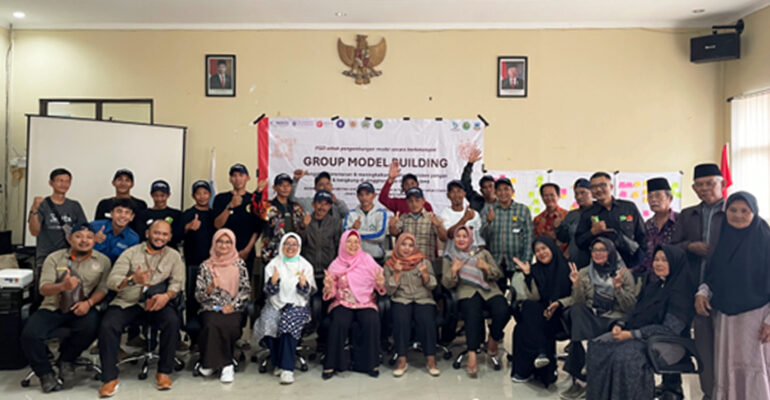Research Collaboration of Department of Agribusiness IPB University Strengthens Resilience of Peri-Urban Farmers in Java

Department of Agribusiness, Faculty of Economics and Management (FEM) IPB University conducted research within the framework of the Knowledge Partnership Platform Australia-Indonesia (KONEKSI) research collaboration.
This research collaboration was conducted with the University of Queensland (UQ) Australia, the National Research and Innovation Agency (BRIN), Gadjah Mada University (UGM), State University of Malang (UM), and Muhammadiyah University of Yogyakarta (UMY), and funded by The Department of Foreign Affairs and Trade (DFAT) Australia.
The theme of the research was “Addressing Vulnerabilities and Enhancing Resilience in the Smallholder Value Chains of Java’s Peri-Urban Food Supply Systems” and covered Jakarta, Bandung, Yogyakarta, and Surabaya.
Lasting for one and a half years (2023-2025), this research involves a team of IPB University researchers, namely Prof Amzul Rifin as chairman; Dr Yanti Nuraeni Muflikh; Tintin Sarianti, MM; and Dr Maryono.
The main locus was in the peri-urban areas of Bandung Regency and Garut Regency. The main commodities studied are rice as a strategic food and kale as a vegetable rich in micro nutrients.
As part of the research series, the IPB University team led by Dr Yanti Nuraeni Muflikh conducted focus group discussions (FGDs) using the Group Model Building (GMB) method in both areas.
The first phase of FGDs was conducted on June 5-10, 2024 in three locations to gather information related to problems, opportunities, and challenges faced by farmers and value chain actors. The results of the discussion were then processed into a cause-and-effect diagram that represented the real conditions in the field. The second phase, held on October 23-26, 2024, focused on model validation involving the same participants.
This activity involved 20-30 participants in each location, consisting of farmers, business actors, and local government representatives. The average participant rating for the GMB process was 4.28 (excellent category), while the results produced received a rating of 4.11 (good category) on a scale of 1-5. Participants considered that the GMB method was very communicative, transparent, and reflected real conditions.
The KONEKSI activities, especially the GMB method, were well received by various parties. The Garut District Agriculture Office, Ir Haeruman MP, through the Chief of Food Crops, Horticulture, and Plantation Facilities, Ardhy Firdian, MSi, emphasized the importance of collaboration between academics, government, and farmers.
“Collaboration like this is very important to find innovative solutions that can improve the welfare of smallholder farmers and answer the challenges of the food supply system such as the impact of El Niño, land limitations, and rising fertilizer prices,” Ardhy said.
Similarly, the Chief of Economic Development Planning and Natural Resources of Bandung Regency Bappeda, Dr Dadan Wardhana, hopes that the results of this research can strengthen the potential of peri-urban agriculture to adapt to climate challenges and urbanization.
Participants from among the farmers, such as Tri Susilo from Tarogong Kaler Subdistrict, appreciated the activity. “The results of this FGD are expected to be used as policy material in favor of farmers,” he said.
With a participatory systems approach, the research is expected to identify leverage points for effective interventions in building a resilient and sustainable food system. (MW/Rz) (IAAS/RUM)



